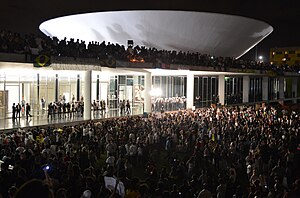
Back احتجاجات البرازيل 2013 Arabic Proteste in Brasilien 2013 German Διαδηλώσεις στη Βραζιλία (2013) Greek Protestas en Brasil de 2013 Spanish 2013ko Brasilgo protestak Basque Mouvement protestataire de 2013 au Brésil French ההפגנות בברזיל (2013) HE Բողոքի ակցիաներ Բրազիլիայում (2013) Armenian Protes Brasil 2013 ID Proteste in Brasile del 2013 Italian
| 2013 Brazilian protests | |||
|---|---|---|---|
 Protesters at the National Congress of Brazil, in Brasília, 17 June | |||
| Date | May - June 2013 (minor protests)[a] June – July 2013 (major protests)[b] | ||
| Location | • Over 500 Brazilian cities and at least 27 cities with Brazilian diasporas around the globe | ||
| Caused by | • Increases in bus, train and metro fare in some major cities • Police Brutality • Low quality and insufficient public transport • Multiple issues regarding infrastructure, education and health care among other public services • High cost of living • Increasing government funding of major sports events • Feeling of alienation from government decisions • Multiple scandals of corruption, embezzlement and overbilling in the government • Low investment in public services • Multiple reports of abuse of special benefits conceded to Brazilian politicians • Controversial law in discussion by National Chamber's plans limiting the powers of the Public Ministry to investigate criminal activities, among other reasons | ||
| Goals | • Improvements in public transport's quality and access to the population (subdued 24 June) • Less public transport cost for the population (subdued 24 June) • Increase of government effort and funds to improve other key public services including public education, national health care and transport infrastructure altogether (subdued 24 June) • Less priority to fund major sports events (subdued 24 June) • Revocation of controversial law in discussion by National Chamber's plans limiting the powers of the Public Ministry to investigate criminal activities in the government (subdued 25 June) • "Zero tariffs" • End to police brutality • Democratization of the media | ||
| Methods | • Occupations of public and private buildings, • Autodefense of masses and Black Block, • Demonstrations, • protest marches, • online activism and alternative media, • Direct action, • Graffiti, banners and signs, • Barricades, • attacks to government power and capitalist symbols, • Destruction and firebombing of buses. | ||
| Status | Major protests subsided | ||
| Number | |||
| |||
| Casualties | |||
| Death(s) | 13+ [2] | ||
| Injuries | 100[3] | ||
| Arrested | 250[3] | ||
The 2013 Brazilian protests[c][9] were public demonstrations in several Brazilian cities, initiated mainly by the Movimento Passe Livre (Free Fare Movement), a local entity that advocates for free public transportation.
The demonstrations were initially organized to protest against increases in bus, train, and metro ticket prices in some Brazilian cities,[10][11][12][13] but grew to include other issues such as the high corruption in the government and police brutality used against some demonstrators.[14][15] By mid-June, the movement had grown to become Brazil's largest since the 1992 protests against former President Fernando Collor de Mello.[16]
As with the 2013 Gezi Park protests in Turkey, social media has played an important role in the organization of public outcries and in keeping protesters in touch with one another.[17]
Cite error: There are <ref group=lower-alpha> tags or {{efn}} templates on this page, but the references will not show without a {{reflist|group=lower-alpha}} template or {{notelist}} template (see the help page).
- ^ Watts, Jonathan (21 June 2013). "Brazil protests: president to hold emergency meeting". The Guardian. London.
- ^ "Pelo menos 13 pessoas morreram em um ano de protestos pelo país". 13 June 2014.
- ^ a b Mallén, Patricia Rey (17 June 2013). "Brazil's Protests Get More Violent, Reach Brasilia And Threaten The Confederation Soccer Cup". International Business Times. Retrieved 20 June 2013.
- ^ Cite error: The named reference
Autumnwas invoked but never defined (see the help page). - ^ The Brazilian Spring: An Explainer, ABC, June 24, 2013
- ^ "Comissão de Cultura da Câmara ouve Fora do Eixo e Mídia Ninja". Rede Brasil Atual. Archived from the original on 4 October 2015. Retrieved 2 October 2015.
- ^ "Racha e expulsões no Bloco de Lutas - Rosane de Oliveira". Archived from the original on 4 October 2015. Retrieved 2 October 2015.
- ^ "UJS comemora neste domingo 29 anos de luta". Retrieved 2 October 2015.
- ^ "Protests in Brazil". The Economist. 18 June 2013. Retrieved 2 October 2015.
- ^ Arias, Juan (12 June 2013). "Brasil se levanta en protesta contra el aumento de los precios del transporte". El País (in Spanish). Retrieved 13 June 2013.
- ^ Arias, Juan (14 June 2013). "São Paulo vive una nueva noche de protestas con escenas de guerra". El País (in Spanish). Retrieved 14 June 2013.
- ^ Arias, Juan (14 June 2013). "Brésil: manifestations contre la hausse du prix des transports". Le Monde (in French). Retrieved 14 June 2013.
- ^ Brocchetto, Marilia (12 June 2013). "Protesters, police clash in Sao Paulo streets over fare increases". CNN. Retrieved 13 June 2013.
- ^ Cite error: The named reference
anistiawas invoked but never defined (see the help page). - ^ "Associação de jornais condena ação da PM". Gazeta do Povo (in Portuguese). 14 June 2013. Archived from the original on 7 April 2014. Retrieved 20 June 2013.
- ^ Cite error: The named reference
el paíswas invoked but never defined (see the help page).